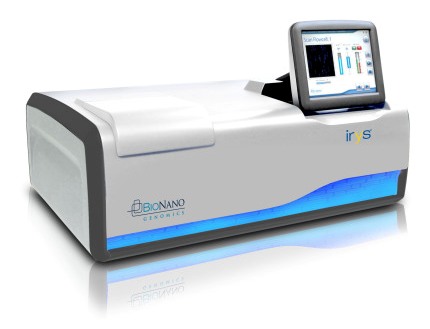Nov 7 2012
BioNano Genomics today announced the commercial rollout of its breakthrough Irys™ System, an intuitively designed genome mapping system that empowers genomics researchers with a new way of analyzing genomic DNA. Irys makes it possible to routinely and accurately detect genomic structural variation and to finish genome assemblies.
 Irys is a novel, automated platform that uses single-molecule imaging to visualize extremely long nucleic acids and reveal genome architecture in its native state, thereby significantly extending the reach of existing genomic technologies. (Photo: Business Wire)
Irys is a novel, automated platform that uses single-molecule imaging to visualize extremely long nucleic acids and reveal genome architecture in its native state, thereby significantly extending the reach of existing genomic technologies. (Photo: Business Wire)
Irys reveals genome architecture in its native state, thereby adding a completely new repertoire to the genomics tool kit. “The Irys System allows researchers and clinicians to access meaningful biological information that is disrupted or completely lost when samples are analyzed by the methods used today such as next-generation sequencing or microarrays,” said BioNano Genomics President and CEO Dr. R. Erik Holmlin, who announced the launch of Irys from the American Society of Human Genetics (ASHG) Annual Meeting, being held in San Francisco, Nov. 6-10. “BioNano Genomics is excited about introducing a new approach that makes it easy to observe genomic architecture and context. We believe this capability will add unprecedented insight into biology and usher in a new wave of discoveries.”
The fully automated Irys benchtop instrument uses the IrysChip to uncoil and confine long DNA molecules in proprietary Nanochannel Arrays™ where they are uniformly linearized in a highly parallel display for high-resolution, single-molecule imaging. Irys does not employ DNA fragmentation or amplification, which are typical with next-generation sequencing. The result is sequence information over extremely long “reads” ranging from hundreds of kilobases to a megabase, where the sample’s valuable structural information is preserved. Irys makes it possible for researchers to directly observe structural variants including replications, deletions, translocations and inversions. “The simplicity, affordability and speed of Irys, which can analyze several gigabases per hour, make it an ideal genome mapping solution for labs of any size,” said Todd Dickinson, VP Commercial Operations, “and we envision broad application throughout genomics and epigenomics, especially in biomedical research and ultimately molecular diagnostics.”
“Complex genomes contain highly repetitive sequences and prove challenging for whole genome assembly,” said Pui-Yan Kwok, MD, PhD, Henry Bachrach Distinguished Professor at the UCSF School of Medicine and senior author of a study published in Nature Biotechnology, which demonstrated the utility of the Irys platform for structural variation analysis and de novo assembly of next generation sequencing (NGS) data. “The BioNano approach to genome mapping readily resolves these issues, and allowed us to achieve haplotype-resolved de novo assembly of the notoriously difficult human MHC region. We are thrilled with the quality of data we are getting with the Irys system and are now deploying this new technology broadly across our research program.
Dr. Kwok will join Dr. Holmlin and others at ASHG to lead an educational workshop at 12:45 p.m. on Nov. 8 at Moscone Center, Room 301. Register to attend the workshop to learn how Irys is bringing a revolutionary tool to genome research. Or, visit BioNano Genomics’ Booth 924/926 on the ASHG expo floor.